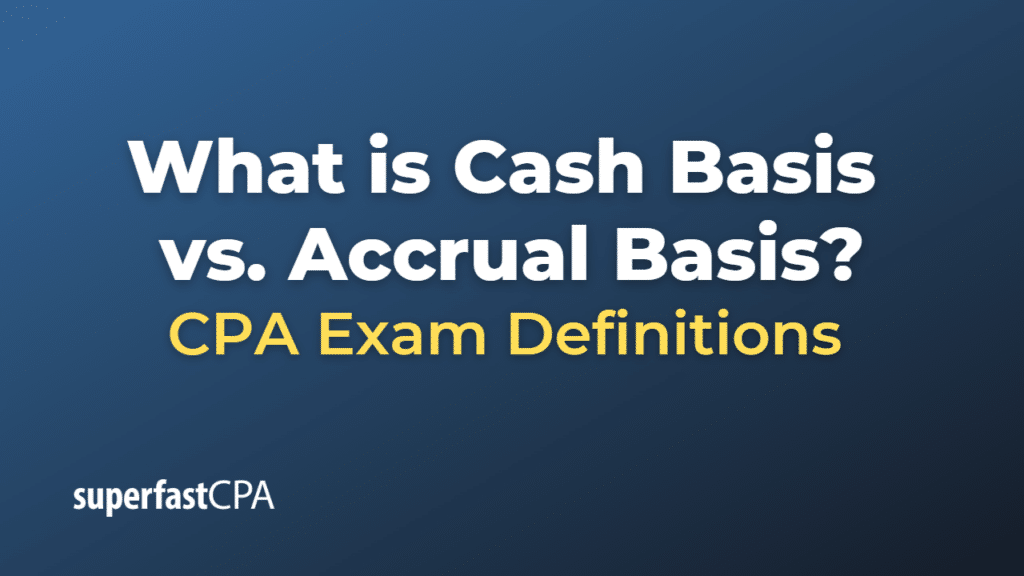Cash Basis vs. Accrual Basis
Cash basis and accrual basis are two different methods of accounting used to record financial transactions. Each method has its own set of rules for recognizing revenues and expenses, which can lead to differences in financial reporting and analysis. Here’s a comparison of the two methods:
- Cash basis accounting:
- Revenues are recognized when cash is received from customers.
- Expenses are recognized when cash is paid to suppliers, employees, or other parties.
- Simpler and easier to manage, making it suitable for small businesses, sole proprietorships, or individuals.
- Provides a clear picture of cash flow but may not accurately represent a company’s financial health, as it does not account for outstanding invoices (accounts receivable) or unpaid bills (accounts payable).
- May result in inconsistent matching of revenues and expenses within the same reporting period, making it difficult to assess a company’s profitability and performance accurately.
- Accrual basis accounting:
- Revenues are recognized when they are earned, regardless of when cash is received from customers.
- Expenses are recognized when they are incurred, regardless of when cash is paid to suppliers, employees, or other parties.
- Generally accepted accounting principles (GAAP) and International Financial Reporting Standards (IFRS) require the use of accrual basis accounting for larger businesses or those with complex transactions.
- Provides a more accurate and comprehensive picture of a company’s financial health by considering the timing of revenue and expense recognition.
- Allows for more consistent matching of revenues and expenses within the same reporting period, resulting in a better assessment of a company’s profitability and performance.
In summary, the cash basis of accounting is simpler and focuses on the actual flow of cash, making it suitable for small businesses with straightforward transactions. However, it may not provide a complete picture of a company’s financial health, as it does not account for the timing of revenue and expense recognition. On the other hand, the accrual basis of accounting recognizes revenues and expenses when they are earned or incurred, providing a more accurate representation of a company’s financial position and performance over time, which is particularly important for larger businesses and those required to follow GAAP or IFRS.
Example of Cash Basis vs. Accrual Basis
Let’s consider a small landscaping company, “Green Gardens,” to illustrate the differences between cash basis and accrual basis accounting. Suppose the company has the following transactions in the month of March:
- Green Gardens completes a project for a client and sends an invoice for $5,000 on March 20th. The client pays the invoice on April 10th.
- Green Gardens purchases gardening equipment for $3,000 on March 25th and receives a bill that allows payment within 30 days. The company decides to pay the bill on April 15th.
- Green Gardens pays salaries to employees totaling $4,000 on March 31st for work done throughout March.
Under cash basis accounting, the transactions would be recorded as follows in March:
- Revenues: $0 (payment from the client is received in April)
- Expenses:
- Gardening equipment: $0 (payment is made in April)
- Salaries: $4,000 (payment is made in March)
- Net Income: -$4,000 (loss in March)
Under accrual basis accounting, the transactions would be recorded as follows in March:
- Revenues: $5,000 (revenue is recognized when the project is completed in March)
- Expenses:
- Gardening equipment: $3,000 (expense is recognized when the equipment is purchased in March)
- Salaries: $4,000 (expense is recognized for work done in March)
- Net Income: -$2,000 (loss in March)
In this example, the cash basis accounting method only records cash transactions, which results in a net loss of $4,000 for March. However, this method does not accurately represent the company’s financial performance, as it does not account for the completed project invoiced in March or the gardening equipment purchased in March.
On the other hand, the accrual basis accounting method recognizes revenues and expenses when they are earned or incurred, providing a more accurate representation of Green Gardens’ financial performance during March with a net loss of $2,000. This method takes into account the timing of revenue recognition and expense incurrence, offering a better assessment of the company’s profitability and performance.













